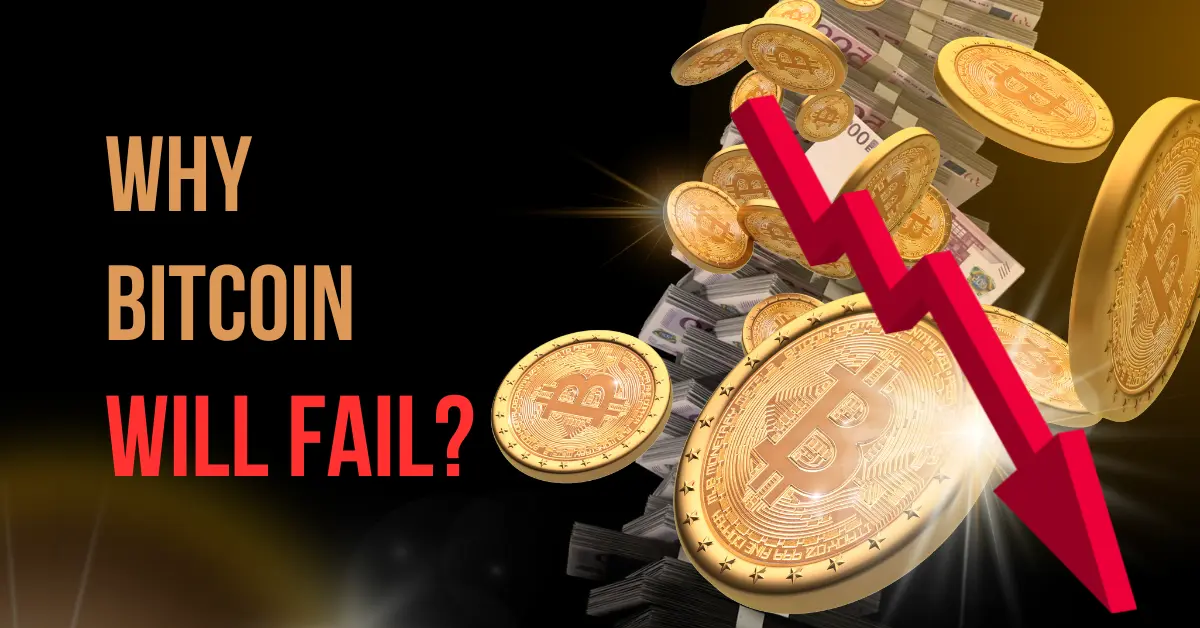Why Bitcoin Will Fail
Bitcoin maximalists will hate this blog post but If I'm going to remain unbiased as a crypto blogger I need to look at the good, bad, and ugly and that is exactly what we are doing in today's post when we explore why Bitcoin might fail.

If the world learned anything from the 2008 financial crisis, it was that nothing is too big to fail. Crypto critics have been expressing similar sentiments regarding Bitcoin, claiming that it is doomed to fail sooner or later.
While many of us still believe in the durability and inevitability of Bitcoin's reign, recent debilitating conditions in the crypto market have seen Bitcoin lose more than half its all-time high price. These astonishing events bitterly do lend credence to naysayers' voices.
In this article, we'll look at some of the reasons why many financial analysts believe the demise of Bitcoin is imminent. And for clarity purposes, this is a bit of a devil's advocate piece. This is a crypto blog after all. And so naturally it will also touch on cryptocurrency enthusiasts' beliefs to give you insight into the actual fate of the BTC market.
What is Bitcoin?
Since you have stumbled upon this post, you must have a rough idea of Bitcoin and the blockchain. For starters, you should know the difference between Bitcoin and Bitcoins. The former refers to the overall concept of the technology (the blockchain), its community, and the software's protocol. On the other hand, bitcoins (not capitalized b) represent a unit of currency of its blockchain technology, sometimes abbreviated as BTC.
Having been acquainted with the basics of Bitcoin, it's vital to note that all its transactions are recorded on a decentralized public ledger, and copies of that information are stored on servers worldwide. These servers, also called nodes, can be installed by anyone with a computer, phone, or tablet accessible to the internet. So, instead of relying on a single point of trust, such as central banks, these nodes cryptographically agree on who has the coins.
So, Why Will Bitcoin Fail?
Over the years, the more popular Bitcoin grew in the crypto market, the more difficult, expensive, and slow it became. Most transactions take roughly 10-30 minutes to complete. In the past year, the median transaction fee has been around $20, which in many instances is higher than what traditional payment platforms charge.
Additionally, Bitcoin's volatile price has rendered it an impractical store of value. For that reason, relentless Bitcoin critics have argued that the cryptocurrency is not living up to the very role it was purportedly created to play in the financial sector.
Below are sound projections contradicting the initial reasons for Bitcoin creation:
Three Reasons Why Bitcoin Could Fail
It Has No Stabilising Force Behind It
A currency cannot function without stability. Therefore, Bitcoin makes for a terrible medium of exchange because of its erratic value.
Due to its volatility, people are less likely to use Bitcoin as payment since they hope its value might increase by a certain percentage in the near future. Similarly, vendors may refuse to accept Bitcoin as payment due to concerns that its value will plummet in a short period.
It Has No Intrinsic Value
Governments can tax their citizens and businesses, sell public property, issue bonds, and use other methods to back traditional financial markets.
However, Bitcoin is only worth what someone else is ready to buy for it in the crypto exchange. It has no intrinsic value.
But Bitcoin enthusiasts will tell you that, like gold, the value of Bitcoin stems from its rarity. The computer code governing Bitcoin set a fixed limit of 21 million units, of which nearly 19 million have been mined. However, a rarity by itself barely qualifies as a source of value.
Crypto investors appear to be operating on the greater fool hypothesis, which states that all it takes to benefit from an investment is to locate a buyer prepared to pay an even higher price.
Bitcoin Mining Is Not Environmentally Friendly
Much criticism against Bitcoin comes from miners executing transactions using significant processing power in exchange for Bitcoin rewards.
According to some estimations, the Bitcoin network uses as much energy as countries like Norway and Argentina combined. Thus, for that reason and the addition of the heaps of electronic waste produced by the specialized devices needed for Bitcoin mining activities have largely been scrutinized by environmentalists.
Bitcoin Critics and What They Have to Say
Bitcoin has its fair share of critics. Below are three of its most powerful and skeptical adversaries.
Warren Buffett
Warren Buffett has long maintained that the crypto investor's narrative will never have a happy ending. His biggest worry is that Bitcoin is a speculative asset with no intrinsic value and produces nothing.
In a TV interview, he remarked,
"When you buy non-productive assets, all you're counting on is whether the next person will pay you more because they're even more excited about the next person coming along. But the asset itself is creating nothing."
Bill Gates
Bill Gates, the founder of Microsoft, has a different reason for not buying into the Bitcoin craze: concern for the environment.
In a recent interview, he stated that:
"Bitcoin utilizes more electricity per transaction than any other mechanism known to mankind."
Peter Schiff
Peter Schiff is the CEO and chief strategist of Euro Pacific Capital, and according to him, the only cryptocurrency worth supporting is backed by gold.
In an interview with Kitco News, Schiff said:
"The only cryptocurrencies that would make sense would be legitimate. Just like I don't like fiat paper currency, a paper currency backed by real money, I don't like fiat digital currency. But, if you have a digital currency backed by gold and redeemable in gold, that's fine, that's great; I think that would work perfectly."
Bitcoin Rivals and Why They Think Bitcoin Will Fall
Similar to the critics, creators of other cryptocurrencies (altcoins) believe that Bitcoin will fail. Most of these developers have used the shortcomings of Bitcoin's network as the point of origin to introduce their crypto inventions. Hence, it's no doubt why members of these communities are certain Bitcoin will fall.
Ethereum
Ethereum is the second-largest cryptocurrency by market capitalization. It was the first to implement blockchain-based smart contracts, which are responsible for several significant innovations, like non-fungible tokens (NFTs) and decentralized finance (DeFi), that have fueled the explosive growth of cryptocurrencies in recent years.
The Bitcoin network's inability to leverage smart contracts could make it obsolete in the long run.
Cardano
Cardano is a third-generation crypto asset that seeks to address one of Bitcoin'sBitcoin's biggest issues: sustainability. The Cardano blockchain consumes a fraction of the energy used by Bitcoin, making it more palatable to environmentally-conscious consumers.
Therefore, it is felt that if Bitcoin fails to resolve its energy consumption issues, the likes of Cardano might take its spot as the top cryptocurrency.
Solana
Any cryptocurrency network feels rapid compared to Bitcoin, which can only perform roughly seven transactions per second (TPS). But with the ability to process more than 50,000 TPS, the Solana blockchain takes speed to new levels. This makes it far more scalable and appealing than Bitcoin, whose sluggish speeds may eventually put it out of commission.
Is Bitcoin's Destiny Prosperity or Utter Failure?
Bitcoin has made admirable strides since its inception, including being recognized as a legal tender in El Salvador. But it is clear that the digital asset has several challenges, including functionality, sustainability, scalability, and volatility, that need to be addressed, or the whole edifice might come crashing down.
The cryptocurrency's most ardent critics base their predictions of Bitcoin's fall on these key issues, while its closest competitors have made giant strides toward solving them.
Last but not to be taken lightly, a handful of Bitcoin developers have been known to work tirelessly on the network, constantly seeking ways to improve it. For instance, the recent update, the Taproot, attempts to overcome some of the issues of scalability and functionality.
Want to keep reading?
- Bitcoin vs Altcoins: Which is More Profitable?
- The Risks and Rewards of Investing in Blockchain ETFs
- Is Bitcoin Mining Profitable in 2023?
Want to know how you can support Crypto Fireside?
Sign up below. It's free and easy 🔥.

